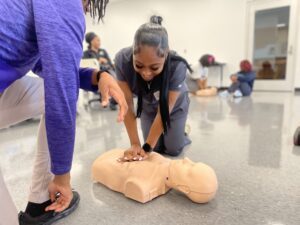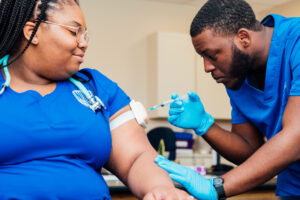Health science professionals play a critical role in delivering efficient, high-quality patient care. Still, too many health care facilities are struggling to fill the demand for nurses and allied health team members. Nearly one-third (31%) of employers have said it’s difficult to find qualified medical assistants, and the numbers paint a similar picture in other roles, like patient care, electrocardiography, and billing and coding (National Healthcareer Association, 2024). We need to do more to meet our country’s health care workforce demands.
New Orleans Career Center (NOCC), where I serve as director of work-based learning, is taking a novel approach to help meet this need and improve care outcomes for our community. We’ve built a sustainable and empowering program that connects high school students and adults with allied health careers. Through our partnership with the National Healthcareer Association (NHA), which provides educational materials and accredited, industry-recognized certification exams, more than 160 NOCC health care trainees certified as medical assistants and patient care technicians in 2023 alone.
Students discover professional goals.

NOCC works closely with local employers to bridge the gap between qualified individuals and job opportunities. These partnerships ensure our trainees gain real-world experiences and build professional networks. In fact, one health care system we work with recently alleviated its patient care technician shortfall in large part due to our program and partnership.
Gabrielle, a graduating high school senior, earned her NHA clinical medical assistant certification in March 2023. Now she works part-time at a local hospital while pursuing a college degree. Her ultimate goal is to become a surgeon, but that wasn’t always her plan. Gabrielle has credited her experience in allied health education at NOCC as the catalyst for her new professional goals.
So, how can other career and technical education programs duplicate this effort to meet growing health care industry demands? Here’s what we’ve learned.
Meet students where they are.

Support instructors in teaching the material and also in building relationships with students, fostering employability skills development, and differentiating instruction to meet community needs.
- Design high-quality work-based learning experiences. Work-based learning opportunities, including job shadowing and clinical experience, help students build the confidence and skills to be job-ready on day one.
- Promote peer-to-peer networks. Foster an environment where students are invested in one another’s success. On-site at one of our provider partners, NOCC graduates have become clinical preceptors. They serve as a valuable resource for students to network and ask questions, and can better connect with them because of their shared NOCC experience.
- Support instructors’ professional development. Empower educators with the software and tools they need to reach as many students as possible. Eighty-six percent of faculty and staff say there’s a need for new skills-based learning models, but only 22% of their institutions have implemented them (Blake, 2024).
- Offer accredited, industry-recognized credentials. Certain credentials are preferred and often expected by health care employers. These will propel students into their careers as competent, practice-ready professionals. According to NHA (2024), 83% of employers would prefer to hire a candidate with nationally recognized certifications over someone without.
- Engage employers in a responsive partnership. Strong partnerships help students develop the academic, technical, and employability skills necessary to act as clinicians the moment they graduate. NOCC’s employer partners are key to designing learning that scaffolds into certification and employment. They facilitate meaningful work-based learning experiences, share feedback, and help students navigate complex, real-world scenarios.
Potential partners
- Curriculum and content writers
- Workforce development organizations
- Credentialing and certification organizations
- Technology providers
- Governmental bodies
- Counselors and career coaches
- Professional development and training providers
- Health care employers
- Funding partners
- Students and their families
Conclusion

In New Orleans, Louisiana, we’ve proven that community-wide partnerships can make a meaningful difference in both individual opportunities and workforce shortages. Programs such as those at NOCC should be supported and can be replicated in other cities and states. Rise to the challenge: Help us meet the growing demand for care. Together we can build a sustainable, diverse health care workforce.
Courtney Kahn Guidry is the director of work-based learning at the New Orleans Career Center.





